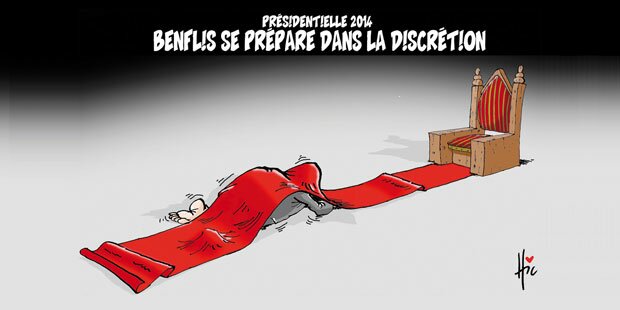Running a serious campaign against the establishment candidate in Algeria’s political system is political suicide, a one-way ticket to permanent exile in the political wilderness. Whoever the pouvoir, the civil-military establishment, chooses, will of course have a few sham opponents-some pace cars, as it were-writes Abed Charef. But there will be only one real candidate, and unfortunately with only a few months to go, the decrepit and perpetually-rumored-to-be-on-his-deathbed current president has not publicly announced whether it will be himself.
Thus the strange and dispiriting spectacle of a presidential election with no candidates: in Algeria, all of the political players who would like to run for the top office are standing around with fixed smiles and gritted teeth, waiting for an announcement-any announcement-from Abdelaziz Bouteflika.
Well, they all learned their lesson this time around. Apart from Ahmed Benbitour, no serious candidate has entered the presidential race, and of course Benbitour has neither the backing of a political party, nor the armored tank division he would need to bring him to power. As for Ali Benflis, in spite of pressure from people around him who say he should throw himself into the campaign, [the former 2004 presidential candidate]remains very cautious. He has eluded every question, declined every invitation, while he waits for the moment when the situation will be clearer.
And [former prime ministers]Ahmed Ouyahia and Abdelaziz Belkhadem? They are maintaining strict radio silence. Both men are keeping their heads down, carefully avoiding the least comment or tiniest action. They know perfectly well that the rules of the Algerian political system follow an implacable logic: at the first unauthorized move, you are politically dead; take the tiniest initiative without permission, and the punishment falls like a merciless guillotine. A red card: you are out of the game.
The only people showing their faces are those who want Bouteflika elected to a fourth term, and even that has been a pretty limp affair. Amar Ghoul and Amara Benyounes have announced their support for Bouteflika next year, and have begun campaigning. But even they themselves seem unconvinced, perhaps not confident that the president’s health will really allow another term.
The result is that all political activity of the country is basically paralyzed. Nothing is going on in Algeria. Neither political debate, nor [civic]activity. The gesticulations of a few ministers, or the pointless rambling of Prime Minister Sellal do nothing to fill the political void. The machine appears to have broken down; the lights have gone out.
Of course there are those who bemoan this situation, who criticize it, even those who denounce it with striking virulence. There are plenty of them, as a matter of fact. But their voices don’t carry far. Only a few political insiders, members of the country’s political machinery are listening, or paying attention to the empty protests of a few well known but marginal figures in the capital.
In August, a crisis briefly roiled the [historical ruling party]FLN, but then the capital returned to its torpor. So we find ourselves in a country which is in theory preparing to go through a presidential election, but in practice lacks even the least electoral excitement, shows not a sign that a major election is coming.
The cause of this strange paralysis is very simple. To date, no one in the country has been able to answer the single question upon which everything else depends: will President Abdelaziz Bouteflika run for another term? If the president wants to remain in power, it is clear that nothing and nobody can stop him. All of the other undeclared candidates know it. Not because Bouteflika has absolute power, or because he has conquered all of the other groups who control state power in Algeria, but because at present, Bouteflika governs in the name of a consensus within the state establishment, and if he decides that he wants to stay, he will remain, for the sake of this same consensus.
Up until now, Algeria’s political figures and political parties just do not know if the president will launch himself into another campaign or not. So they are simply waiting. They are grinning and bearing it, and cannot make the slightest move before they know what he will do.
For President Bouteflika himself, keeping everyone else in suspense is a win-win game. If he really wants to remain in power, he will win by default, since his adversaries will not even show up. If on the other hand he in fact is ready to quit, he can finish out his term restfully without the bluster and bother of a real campaign to succeed him. So, either way, it is in his interest to delay his public decision as long as possible.
The moment the first smoke signal goes up though, everything will come to a boil. If Bouteflika is to run again, his electoral pace cars will launch themselves from the starting line; they are numerous and they are available. They will play by the rules of the game: they will run their little campaigns, they will follow arduous campaign trails, they will deliver many speeches. And then they will lose and the curtain will fall and we will once again be in a country that is totally stagnant.
If on the other hand, Bouteflika does not seek the presidency again, political life in the country might well be totally transformed. A whole different struggle will be underway, even if we won’t actually know whether it is a real battle among independent candidates, each with their own political project, or a fictitious battle between false candidates whose only role is to reassure those inside the establishment. In any case, we will know that the worst is already behind us. And nothing prevents us from hoping that Algeria might head toward an inclusive political transition that will follow a peaceful and gradual course.
Abed Charef
18 Oct 2013




































